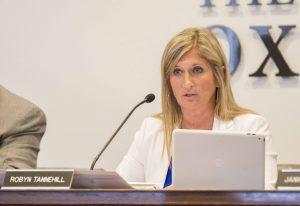The Oxford Police Department, Mayor Robyn Tannehill and the Board of Aldermen are all supporting proposed legislation that would extend bar hours to 2 a.m on the Square, while the sale of alcohol would still end at 1 a.m.
State law currently does not differentiate between the sale and consumption of alcohol. While Oxford presently maintains the legal right to expand both, the city is advocating for the law to make a distinction between the two so that it can end sales at 1 a.m. and end consumption at 2 a.m.

Mayor Robyn Tannehill leads the Board of Aldermen in a public discussion concerning the downtown district ordinance on June 15, 2019. File photo by Christian Johnson
The city is advocating for the law to be changed so that customers could order alcohol until 1 a.m. and remain in the bars drinking until 2 a.m.
“Something we’ve always tried to push was extending bar hours because this would just allow folks more time to leave downtown safely,” OPD Captain Hildon Sessums said. “We want to get the state legislature to allow us to let someone order a drink 15 minutes before the sale of alcohol ends but then have a safe amount of time to finish it.”
The Board of Aldermen recently adopted a resolution asking the state to consider legislation to differentiate between the sale and consumption of alcohol. Should the state pass said legislation, the City of Oxford will subsequently extend the hours for alcohol consumption, and the bars plan to extend their hours.
Over 4,000 people on weekends are regularly forced out of downtown bars and into the surrounding two-block area on the Square when the sale of alcohol ends and bars close, according to the mayor.
“This creates a chaotic atmosphere between 12:40 a.m and 1 a.m. in a very densely populated downtown district, as patrons are pushed out of every establishment at the same time,” Tannehill said.
“From looking at it right now, it looks like a great idea that could work out,” said Lee Harris, the owner of Funky’s Pizza and Daiquiri Bar. “At the same time, I have to think about the effect that closing later would have on my staff and the long hours they would be working. They already have to stay an hour or so after closing.”
While Harris doesn’t think this legislation will necessarily make nights on the Square safer for bar patrons, he said that extending bar hours could definitely increase efficiency when closing time comes.
“If this passes, you don’t have this mass push at one time,” Sessums said. “There will be people ready to leave the bars at 1 a.m. and before, but then others will stay until 2 a.m., creating more of a trickle effect than a mass exodus.”
Tannehill and Sessums agree that extending bar hours would make crowds more manageable for OPD while also allowing bar patrons to secure safe transportation more easily. OPD and the city have previously tried to make the Square safer at night with the passage of the “Alcohol and Safety” ordinance.
“Taxi companies and Uber drivers are available at 1 a.m., and the first folks out secure a safe ride home,” Tannehill said. “However, since everyone exits at the same time, by the time the taxis and Ubers return, the crowd is gone. Allowing crowds an extra hour to trickle out would allow taxis and Ubers the ability to circle back and get more patrons home safely.”
University students are, unsurprisingly, in favor of extending bar hours as well.
“A lot of people talk about how unfair it is that other college towns have much later bar hours, and here, students just don’t understand why our bars close so early,” sophomore business administration student Caroline Sanders said. “I think you would be hard pressed to find an Ole Miss student against bars staying open later, even if they stop selling alcohol for that last hour.”
In other towns home to SEC schools like Auburn, Alabama, LSU and Georgia, most bars close at 2 a.m., which is the closing time the city of Oxford is currently pushing for.
Thirty-one businesses on the Square currently have on-premise alcohol permits. Combined with the growing student population in Oxford and the number of university functions that are held downtown, Tannehill said the challenges faced by the city are unique and in need of being addressed soon.
“It’s in the hands of the state legislature now,” Sessums said. “I would say the earliest we could see this come into effect is July 1.”






